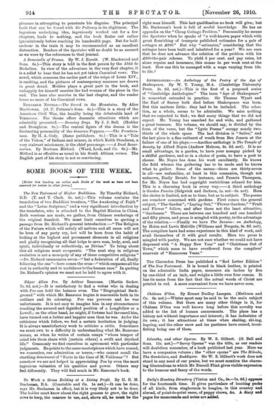diemaotoanis. — An Anthology of the Poetry of the Age of Shakespeare.
By W. T. Young, M.A. (Cambridge University Press. 2s. 6d. net.)—This is the first of a proposed series of "Cambridge Anthologies." The term "Age of Shakespeare" is somewhat extended in practice. Sir Thomas Wyatt and the Earl of Surrey both died before Shakespeare was born. But this matters little: they had to be included. The selec- tion, as a whole, seems to be admirable. We miss nothing that we expected to find ; we find many things that we did not expect. Mr. Young has searched far and wide, and gathered a great treasure. His volume, we should say, is divided by the form of the verse, but the "Lyric Poems" occupy nearly two-. thirds of the whole space. The last division is "Satire," and the last piece is a fine outburst of wrath from Ben Jonson at the failure of one of his plays.—Another anthology is The Temple of Beauty, by Alfred Noyes (Andrew Melrose, 3s. 6d. net). It is no small advantage, in a garden, to have your nosegay picked by a skilful gardener, and so in a choice of poets, to have a poet to choose. Mr. Noyes has done his work excellently. He knows the field whence the gathering has to be made and he knows what to gather. Some of the names—there are thirty-seven in all—are unfamiliar, at least in this connexion, though not unknown, Emily Bronto, for instance, and Francis Thompson, for Mr. Noyes has had copyright restrictions relaxed for him. This is a charming book in every way.—A third anthology is Garden Fancies (Sidgwick and Jackson, 1s. net-3s. net). Here the choice is limited, not as to time, but as to subject. The poems are somehow concerned with gardens. First comes the general subject, "The Garden"; "Laying Out," "Flower Gardens," "Fruit and Flower" follow, and after these not the least attractive, "Gardeners." There are between one hundred and one hundred and fifty pieces, and prose is mingled with poetry, to the advantage of the relation.—Finally we have The Seasons : an Anthology, by Helen and Lewis Melville (Williams and Norgate, 3s. 6d. net). The compilers have had some experience in this kind of work, and avail themselves of it with good results. Here too prose is mingled with poetry. We are not sure whether we could not have dispensed with "A Happy New Year" and "Christmas Out of Town," which seem to have overflowed from the compilers' reservoir of "Humorous Verse."


















































 Previous page
Previous page